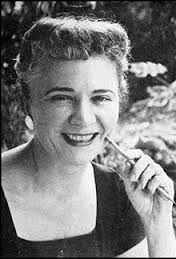Today, January 24, is the birthday of C. L. Moore (1911-1987). I’ve been doing birthday post in honor of her for more eyars than I can count off the top of my head. For a while I was posting about the Jirel of Joiry and Northwest Smith stories, her two major works of fantasy. And yes, Northwest Smith is fantasy. It just happens to be set in space.
But Moore did write science fiction. Judgement Night and “No Woman Born” come to mind. “Vintage Season”, a masterpiece of time travel and tragedy, is usually attributed to her, even though her husband Henry Kuttner contributed to the story.
And that’s the rub. Once Catherine and Hank married, nearly everything they wrote was a collaboration.
Supposedly, one could sit down at the typewriter and pick up where the other left off, even if the first one stopped in mid-sentence. I’m still not sure how that works. Moore is on record as saying she wasn’t sure who contributed what to different stories. She said there were a few differences in spelling, such as “gray” and “grey”.
I think they each brought a strength to their work that was different than the others. That’s easy to see if you read some of their solo work that was published before they married.
Moore was the better stylist. Her porse was lush and rich whereas Kuttner’s was more utilitarian. Kuttner on the other hand, tended to come up with more ideas, some of them pretty screwball, such as the Gallagher stories or the Hogben stories.
Together, though, I think what they produced was generally superior to what they could do individually. After all, their best-known science fiction tended to be collaborations. For example, Fury, “Mimsy were the Borogoves”, “The Twonky”, “We Kill People”, “Tomorrow and Tomorrow”, and “A Gnome There Was”.
Much of their work was published under Kuttner’s byline because, as Moore has gone on record saying, he got a better word rate than she did. So much of her contribution has been lost to time as a result of the apparent sexism of pulp editors.
That’s a shame, because I don’t think we’d have any of those stories if it hadn’t been for Moore. At least not in the form they are now.







